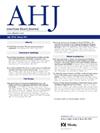A randomized controlled trial of gamification to increase physical activity among black and Hispanic breast and prostate cancer survivors: Rationale and design of the ALLSTAR clinical trial
IF 3.7
2区 医学
Q1 CARDIAC & CARDIOVASCULAR SYSTEMS
引用次数: 0
Abstract
Background
Survivors of breast and prostate cancer, especially those that are Black and/or Hispanic, are at high risk for cardiovascular events. Physical activity can reduce the risk of cardiovascular events in cancer survivors, but Black and Hispanic people are less likely to engage in routine physical activity. Concepts from behavioral economics have been used to design scalable, low-touch gamification interventions that increase physical activity in individuals at high risk for cardiovascular events, but the effectiveness of these strategies in Black and Hispanic survivors of breast and prostate cancer is uncertain.
Study Design and Objectives
ALLSTAR (NCT05176756) is a pragmatic, virtual randomized controlled trial designed to evaluate the effectiveness of a gamification intervention informed by behavioral economic concepts to increase daily physical activity in Black and Hispanic breast and prostate cancer survivors who received cardiotoxic therapies and have additional risk factors for cardiovascular disease. Patients are either referred by their cancer care team or identified by electronic health record searches; contacted by letter, email, text message and/or phone; and complete enrollment and informed consent on the Penn Way to Health online platform. Patients are then provided with a wearable fitness tracker, establish a baseline daily step count, set a goal to increase daily step count by 1,500-3,000 steps from baseline, and are randomized 1:1 to control or gamification. Interventions continue for 6 months, with follow-up for an additional 3 months to evaluate the durability of behavior change. The trial has met its enrollment goal of 150 participants, with a primary endpoint of change from baseline in daily steps over the 6-month intervention period. Key secondary endpoints include change from baseline in daily steps over the 3-month post-intervention follow-up period, change in moderate to vigorous physical activity over the intervention and follow-up periods, and change in patient-reported measures of physical function, fatigue, and overall quality of life.
Conclusions
ALLSTAR is a virtual, pragmatic randomized clinical trial powered to demonstrate whether gamification is superior to control in increasing physical activity in Black and Hispanic breast and prostate cancer survivors. Its results will have important implications for strategies to promote physical activity in survivors of breast and prostate cancer, specifically among minority populations.
Clinical Trial Registration
clinicaltrials.gov; https://clinicaltrials.gov/study/NCT05176756
游戏化增加黑人和西班牙裔乳腺癌和前列腺癌幸存者体育锻炼的随机对照试验:ALLSTAR 临床试验的原理与设计。
背景:乳腺癌和前列腺癌幸存者,尤其是黑人和/或西班牙裔幸存者,是心血管事件的高危人群。体育锻炼可以降低癌症幸存者发生心血管事件的风险,但黑人和拉美裔人参与常规体育锻炼的可能性较低。行为经济学的概念已被用于设计可扩展、低接触、游戏化的干预措施,以增加心血管事件高风险人群的体育锻炼,但这些策略对黑人和西班牙裔乳腺癌和前列腺癌幸存者的有效性尚不确定:ALLSTAR(NCT05176756)是一项务实、虚拟的随机对照试验,旨在评估以行为经济学概念为基础的游戏化干预措施对接受过心脏毒性疗法并存在其他心血管疾病风险因素的黑人和西班牙裔乳腺癌和前列腺癌幸存者增加日常体育锻炼的有效性。患者由其癌症护理团队转介或通过电子健康记录搜索确定;通过信件、电子邮件、短信和/或电话与患者取得联系;并在宾大健康之路在线平台上完成注册和知情同意。然后,为患者提供可穿戴健身追踪器,确定每日步数基线,设定每日步数在基线基础上增加 1500-3000 步的目标,并按 1:1 随机分配到对照组或游戏化组。干预持续 6 个月,并再进行 3 个月的随访,以评估行为改变的持久性。该试验已达到招募 150 名参与者的目标,其主要终点是在 6 个月的干预期内每日步数与基线相比的变化。主要次要终点包括干预后 3 个月随访期间每日步数与基线相比的变化、干预期间和随访期间中度到剧烈运动的变化,以及患者报告的身体功能、疲劳和整体生活质量的变化:ALLSTAR是一项虚拟、务实的随机临床试验,旨在证明游戏化在增加黑人和西班牙裔乳腺癌和前列腺癌幸存者的体育锻炼方面是否优于对照组。其结果将对促进乳腺癌和前列腺癌幸存者(尤其是少数民族人群)体育锻炼的策略产生重要影响。临床试验注册:clinicaltrials.gov;https://clinicaltrials.gov/study/NCT05176756。
本文章由计算机程序翻译,如有差异,请以英文原文为准。
求助全文
约1分钟内获得全文
求助全文
来源期刊

American heart journal
医学-心血管系统
CiteScore
8.20
自引率
2.10%
发文量
214
审稿时长
38 days
期刊介绍:
The American Heart Journal will consider for publication suitable articles on topics pertaining to the broad discipline of cardiovascular disease. Our goal is to provide the reader primary investigation, scholarly review, and opinion concerning the practice of cardiovascular medicine. We especially encourage submission of 3 types of reports that are not frequently seen in cardiovascular journals: negative clinical studies, reports on study designs, and studies involving the organization of medical care. The Journal does not accept individual case reports or original articles involving bench laboratory or animal research.
 求助内容:
求助内容: 应助结果提醒方式:
应助结果提醒方式:


